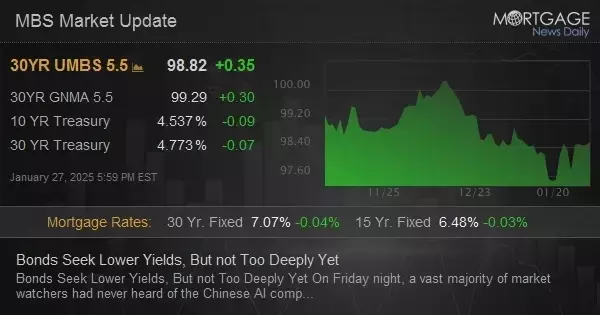
In recent developments, the emergence of a Chinese AI company has sparked significant discussions among market observers. This unexpected rise has led to shifts in investor sentiment, particularly impacting the bond market. Additionally, new home sales data exceeded expectations, contributing to volatility in mortgage-backed securities (MBS) and Treasury yields. While these changes are notable, it is premature to conclude that they signify a long-term trend towards lower interest rates.
The Impact of DeepSeek on Investor Sentiment
A previously unknown entity in the financial world, DeepSeek has suddenly become a focal point for investors. The company's rapid ascent to prominence can be attributed to its cost-effective AI solutions, which rival those of established players like ChatGPT. Within just 24 hours, DeepSeek reached the top of Apple's free app download chart, signaling a potential shift in market dynamics. Investors began questioning the valuation of tech giants such as NVDA, leading to one of the largest daily declines in market capitalization in history. This event prompted many investors to seek safer havens, with the bond market being a primary beneficiary.
The sudden surge of interest in bonds reflects a combination of factors. Some investors may have been hedging against potential economic impacts, while others saw an opportunity to capitalize on the market's volatility. Regardless of the motivation, the influx of funds into the bond market has resulted in lower yields. However, it is important to note that this movement does not necessarily indicate a lasting trend towards lower interest rates. Such a conclusion would require additional evidence of disinflation and softer economic data, along with reduced Treasury issuance. For now, the bond market remains cautious, awaiting further confirmation before making any definitive statements about future rate movements.
New Home Sales and Financial Market Volatility
New home sales data has revealed a stronger-than-expected performance, surpassing forecasts by a considerable margin. This positive news initially boosted market confidence, leading to gains in MBS and a decline in 10-year Treasury yields. However, these gains were partially reversed as the day progressed, reflecting ongoing uncertainty in the market. Despite the fluctuations, MBS maintained steady improvements throughout the day, ending up nearly three-eighths higher. Meanwhile, the 10-year yield dropped by over 10 basis points, settling at 4.528%.
The volatility observed in the financial markets underscores the complex interplay between various economic indicators and investor sentiment. New home sales serve as a critical barometer for the health of the housing sector, which in turn influences broader economic conditions. The strong performance in this area suggests resilience in consumer demand, even amid concerns about rising interest rates and economic slowdowns. Nevertheless, the bond market's reaction highlights the delicate balance between optimism and caution. Investors remain vigilant, closely monitoring economic data and market trends to gauge the direction of interest rates. While the immediate impact of new home sales data has been positive, sustained improvements will be necessary to solidify market confidence and influence long-term interest rate trends.
